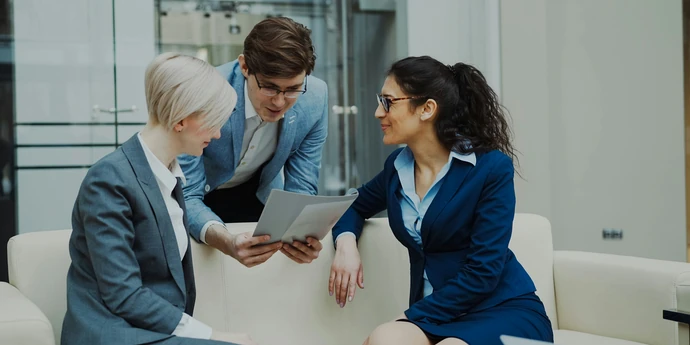You will typically have to go through 5 to 10 interviews before being offered a job in consulting. It’s very likely that at some point in the process, one of your interviews won’t be face-to-face. Instead, it will be a phone or a video interview.
The usual case interview tips apply for phone and video interviews as well. But there are a number of points to keep in mind as you prepare for this specific format. Let’s go through the top 3 things that make phone case interviews different and how you should prepare for them.
Click here to practise 1-on-1 with MBB ex-interviewers
1. Expect phone interviews earlier in the process
This type of interviews tend to be used by McKinsey, BCG and Bain early in their recruiting process. If you have been invited to one of them it means that the firm likes your resume and cover letter. They want to talk to you for a first assessment before bringing you into their office for a series of more in-depth conversations. There are two main reasons consulting firms do that.
The first one is time. Consultants and partners travel a lot and are usually outside of the office from Monday to Thursday. It’s therefore just easier to organise a phone or video case interview than a face-to-face one. This means the firms can screen more people and run a faster hiring process.
The second one is cost. Flying you out to their office is obviously costly. But booking 3 or 4 interviews with Partners while you are in their office also costs the firm money. Before making that investment, they want to make sure that you meet minimum requirements and actually have a chance of getting hired. Doing well at your phone or video interview is therefore obviously mandatory if you want to end up getting an offer.
2. Avoid the “bad phone / video connection” trap
The most frustrating thing that can happen to you in a phone or case interview is to fail because of a “bad phone or video connection”. Don’t let that happen to you. There are things you can and should do to avoid falling into that trap.
First, you should make sure that you will be taking the phone or video call from a place that’s quiet and has good signal / WIFI. This is something you should definitely keep in mind when you pick a time for your interview.
Second, if your connection is fine, but your interviewer’s connection is not, you need to say something. We have worked with a candidate in the past who could barely hear the case situation at the beginning of his interview but did not say anything because he was worried it would come across the wrong way. He was not able to solve the case properly and did not progress to the next round of interviews.
If you can’t hear your interviewer properly, you’ve got to say it and try to find a solution. Suggest to try calling into the line again. And if things don’t improve, ask if it would be possible to try to find another time to speak. Don’t let a technical difficulty come into the way of your success.
3. Pay special attention to communication
Once you can hear your interviewer properly, things will start to feel a lot like a regular case interview. In most cases your interviewer will ask you a fit / behavioural question followed by a case question and the interview will last 30 to 45mins.
But one thing we’ve noticed over the years is that phone interviews tend to put your communication skills under more scrutiny. In a face-to-face interview, your interviewer will be able to clearly read your body language and also take a look at what you write on your piece of paper. It's much harder to do that over the phone or video and what you say and how you say it therefore becomes much more important.
Your goal should be to communicate in a really clear and structured way. Here are three communication tips that will help you achieve this:
- Use numbered lists. Using numbered lists makes it easy for your interviewer to follow what you are doing. For instance, you could say: “I’m going to calculate the market size for smartphones in the US in three steps. First, I’ll calculate X. Second, I’ll calculate Y. And finally, I’ll calculate Z.”
- Summarise what you said. Regularly summarising what you said also helps your interviewer make sure she is on the same page as you are. For instance, you could say: “Right so we have learned three things so far. First, we know that the US smartphone market is worth $10bn. Second, we know the company’s market share is down 3% year on year. And third, we know that costs rose by 5% last year.”
- Talk slower and articulate more than usual. Finally, you shouldn’t hesitate to talk slower and to articulate more than you usually would when you are on the phone or on video. What you say is just harder to understand for the person listening to you because they can't see you as well as they normally would. You need to take that into account and make it easy for them.
Conclusion
If you apply for consulting jobs, chances are you will have at least one phone or video interview early in your recruiting process.
The usual case interview tips apply for this interview format as well. But in addition, you should make sure that you’ve got a good connection and are in the best conditions possible to solve the case. And you should also make an extra effort to communicate in a clear and structured way. This will make a big difference to your interviewer.
How to prepare for consulting interviews
We've coached more than 15,000 people for interviews since 2018. There are essentially three activities you can do to practise for interviews. Here’s what we've learned about each of them.
Learn by yourself
Learning by yourself is an essential first step. We recommend you make full use of the free prep resources on this consulting blog and also watch some mock case interviews on our YouTube channel. That way you can see what an excellent answer looks like.
Once you’re in command of the subject matter, you’ll want to practice answering questions. But by yourself, you can’t simulate thinking on your feet or the pressure of performing in front of a stranger. Plus, there are no unexpected follow-up questions and no feedback.
That’s why many candidates try to practice with friends or peers.
Practise with peers
If you have friends or peers who can do mock interviews with you, that's an option worth trying. It’s free, but be warned, you may come up against the following problems:
- It’s hard to know if the feedback you get is accurate
- They’re unlikely to have insider knowledge of interviews at your target company
- On peer platforms, people often waste your time by not showing up
For those reasons, many candidates skip peer mock interviews and go straight to mock interviews with an expert.
Practise with experienced MBB interviewers
In our experience, practising real interviews with experts who can give you company-specific feedback makes a huge difference.
Find a consulting interview coach so you can:
- Test yourself under real interview conditions
- Get accurate feedback from a real expert
- Build your confidence
- Get company-specific insights
- Learn how to tell the right stories, better.
- Save time by focusing your preparation
Landing a job at a top consulting company often results in a $50,000 per year or more increase in total compensation. In our experience, three or four coaching sessions worth ~$500 will make a significant difference in your ability to land the job. That’s an ROI of 100x!
Click here to book case interview coaching with experienced MBB interviewers.















